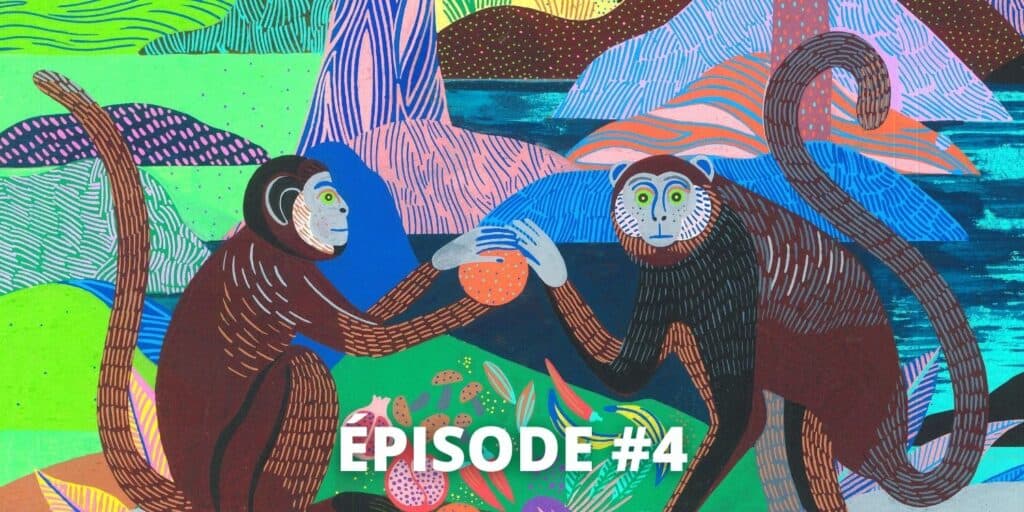Listen to the podcast
Subscribe to Food (R)evolutions!
Follow us on
The benefits of fats for our health
For the fourth edition of our podcast, we’re going to talk well, talk about… fats. Because, as you know if you, too, are fans of Kaamelott, “fat is life”.
Yes, but which fat for which life? That is indeed the question.
Are you more into processed deli meats or cold-pressed organic linseed oil?
Are you more into pasteurized camembert or whole almond puree crushed on a low-temperature millstone?
Because we need fats to live!
Fatty acids have a structural function in our cells, as well as an energy storage function and protection of vital organs, and even hormone production…
So why did we succumb to the low-fat market and hunt down fats over the past decades?
It’s time to take stock of the diversity of fats, the recommended intakes, the best oils for health and how to cook them, or even the specific needs at each age.
The guests
Béatrice Morio : Béatrice holds a PhD in nutritional physiology. She led a team on obesity prevention at the Human Nutrition Unit in Clermont-Ferrand. She then joined the CarMeN laboratory (Cardio-Metabolism, Diabetes, and Nutrition) in Lyon to work on cellular mechanisms related to nutritional prevention. Involved in expert missions in France and internationally, she is a member of the ANSES Nutrition Expert Committee. She is also the president of the French Society for Nutrition.
Sébastien Loctin: Sébastien was born in Lyon into a family of caterers, bakers, and pastry chefs; he always had a taste for real cooking. He spent most of his career in large food companies (including Lesieur and Remy Martin). His journey “from field to plate” made him appreciate what our diet has become and realize that we were far from not only the memory he had as a child but also what he wanted for his children. In 2010, he changed his life to create Biofuture and advocate, with common sense and passion, for a food model that takes care of both Humans and the planet.
My questions
- How, in your respective journeys, did you come to focus on fats?
- What is fat, in brief? And what is its purpose? What impact does fat have on the body?
- Does being fat necessarily mean eating too much fat?
- How did we become lipophobic?
- Why do we like fat from a taste perspective?
- What are the different types of lipids? What is “good fat” and where can it be found in our diet? Is diversity necessary?
- Which oils and generally which fats should be prioritized? And avoided?
- What are the famous Omega 3s and where are they found? Why are they indispensable?
- Is olive oil really the perfect oil? Isn’t that a misconception?
- What is the difference between virgin and organic oil, and refined oil?
- How to cook oils to best enjoy their benefits?
- What are the geographical origins of our oils?
- Is there any seasonality for eating fat?
- Are there specific needs adapted to each age of life? Why is it imperative to have fat in baby’s diet?
- Do we eat too much or not enough fat? Are there recommendations on intakes?
- Finally, a recipe with good oils or good fats for our listeners?
Resources to go further
- A humorous video: The problem with low-fat food (by Coline)
- A video on “the taste of fat” with Philippe Besnard (there is also a link on YouTube if you prefer)
- A video by Thibault Fiolet on his site “What’s on my plate”
- An article from Sciences & Vie in French on the physiology of adipose tissue
- An article from Sciences & Vie in French on the inflammation of adipose tissue
- The secret charm of our fat, and its role in favor of our health, Mariette Boon, Actes Sud
- The wonderful world of fat, All about these curves we inhabit, Laurence Plumey, Eyrolles
- Website of Quintessens
The (R)évolutions Alimentaires podcasts are presented by Louise Browaeys
An agricultural engineer (AgroParisTech) with a specialty in nutrition, Louise has been working for ten years in the fields of agriculture, food, and ecology.
She is the author or co-author of several books on the themes of food, ecology, permaculture, and corporate social responsibility. Notably: “The part of the earth: agriculture as art” (Delachaux and Niestlé, 2014), “Permaculture on a daily basis” (Terre Vivante, 2018), “The planetary diet” (La Plage, 2020).



